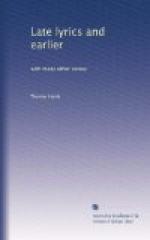Who were the twain that trod this
track
So many times together
Hither and back,
In spells of certain and uncertain weather?
Commonplace in conduct they
Who wandered to and fro here
Day by day:
Two that few dwellers troubled themselves to know
here.
The very gravel-path was prim
That daily they would follow:
Borders trim:
Never a wayward sprout, or hump, or hollow.
Trite usages in tamest style
Had tended to their plighting.
“It’s just worth while,
Perhaps,” they had said. “And saves
much sad good-nighting.”
And petty seemed the happenings
That ministered to their joyance:
Simple things,
Onerous to satiate souls, increased their buoyance.
Who could those common people be,
Of days the plainest, barest?
They were we;
Yes; happier than the cleverest, smartest, rarest.
“THE CURTAINS NOW ARE DRAWN” (SONG)
I
The curtains now are drawn,
And the spindrift strikes the glass,
Blown up the jagged pass
By the surly salt sou’-west,
And the sneering glare is gone
Behind the yonder crest,
While she sings
to me:
“O the dream that thou art my Love, be it thine,
And the dream that I am thy Love, be it mine,
And death may come, but loving is divine.”
II
I stand here in the rain,
With its smite upon her stone,
And the grasses that have grown
Over women, children, men,
And their texts that “Life
is vain”;
But I hear the notes as when
Once she sang
to me:
“O the dream that thou art my Love, be it thine,
And the dream that I am thy Love, be it mine, And
death may come, but loving is divine.”
1913.
“According to the mighty working”
I
When moiling seems at cease
In the vague void of night-time,
And heaven’s wide roomage
stormless
Between the dusk and light-time,
And fear at last is formless,
We call the allurement Peace.
II
Peace, this hid riot, Change,
This revel of quick-cued mumming,
This never truly being,
This evermore becoming,
This spinner’s wheel onfleeing
Outside perception’s range.
1917.
I was not he—the man
Who used to pilgrim to your gate,
At whose smart step you grew elate,
And rosed, as maidens can,
For a brief span.
It was not I who sang
Beside the keys you touched so true
With note-bent eyes, as if with you
It counted not whence sprang
The voice that
rang . . .




